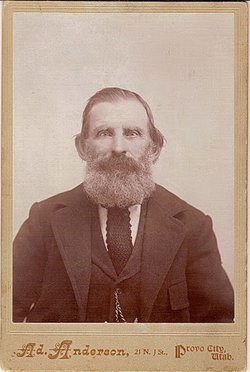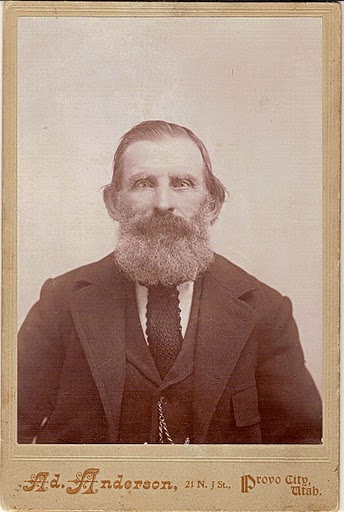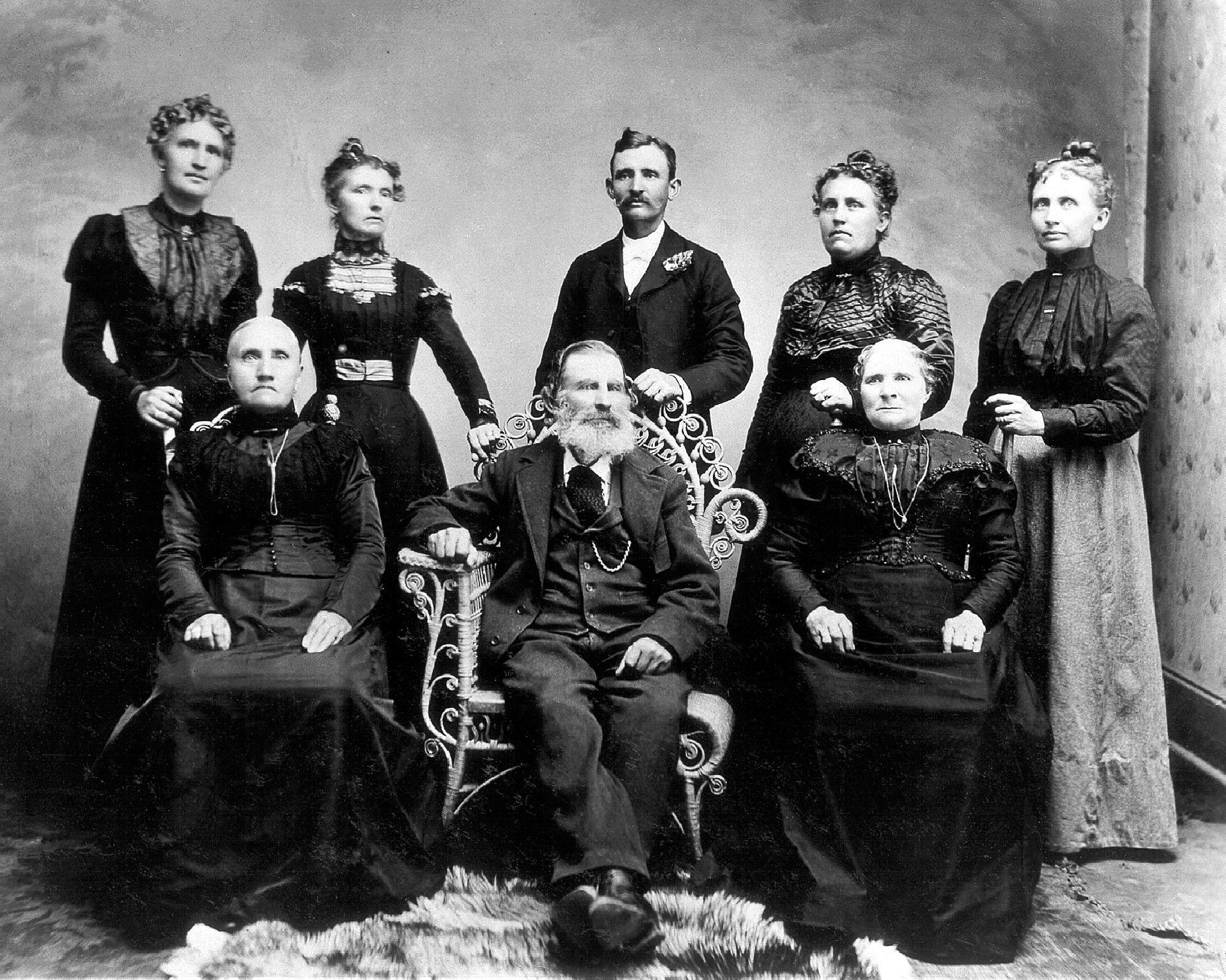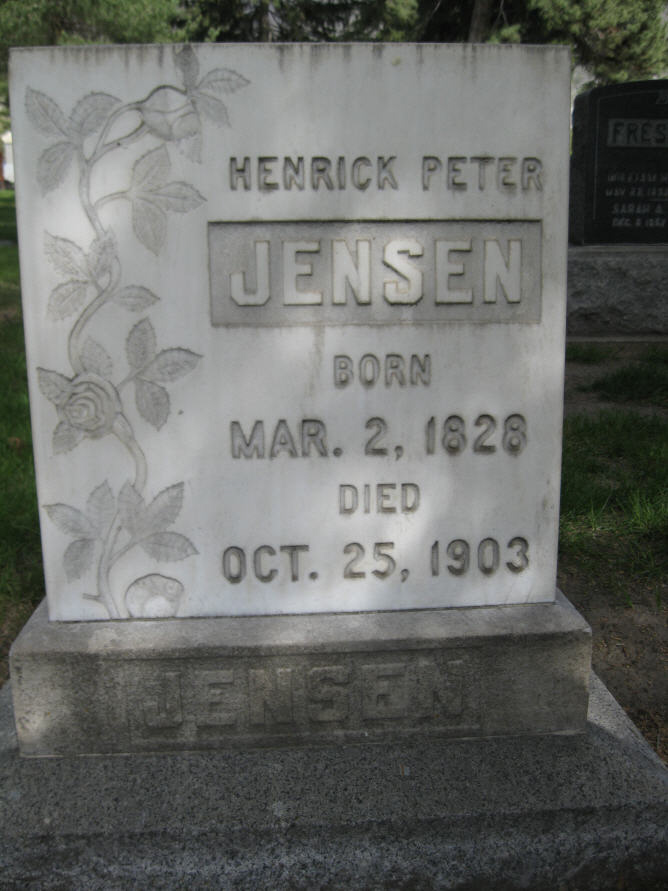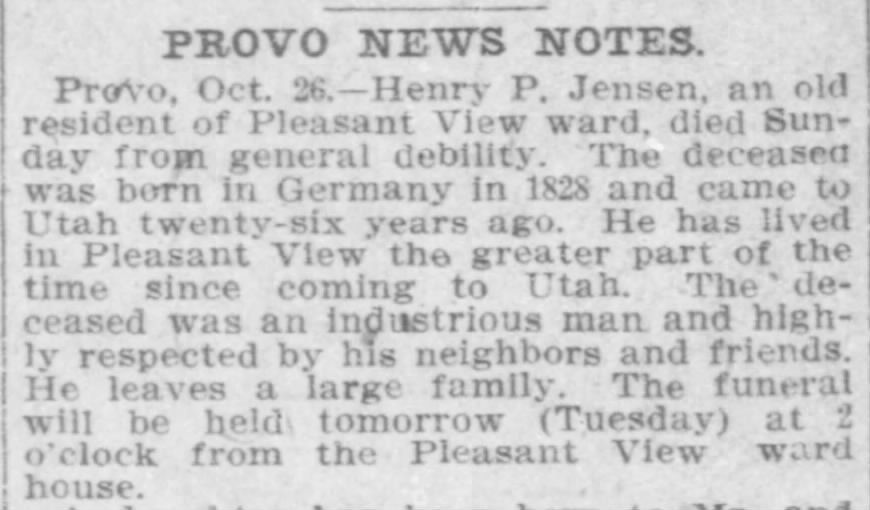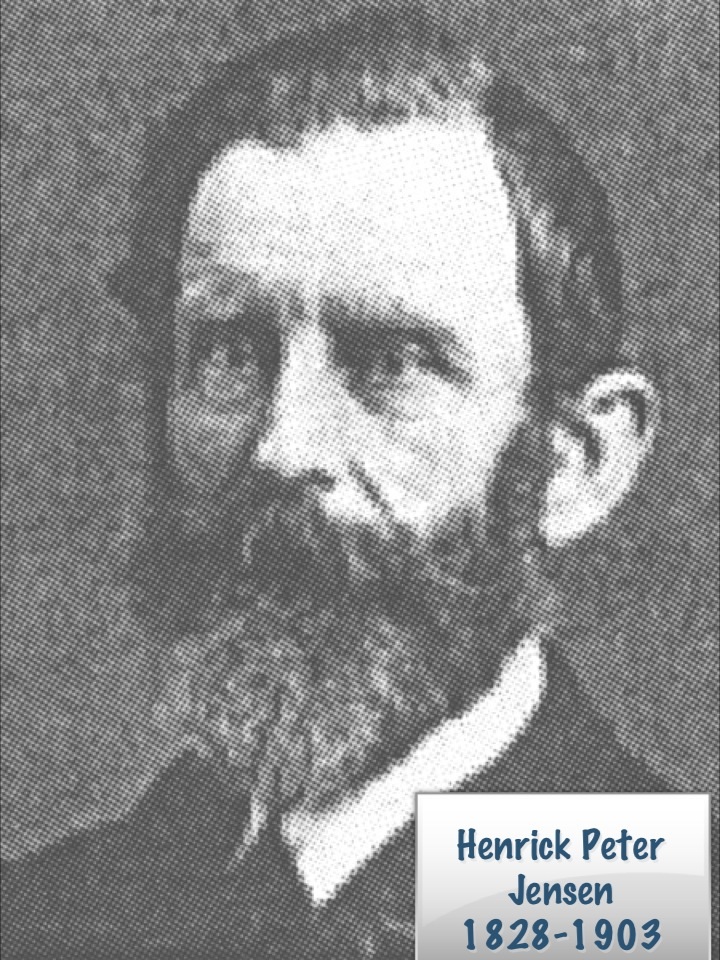Henrick Peter Jensen was born March 2, 1828 in Osterhaven, Schleswig-Holstein, Prussia (Germany). He was the son of Peter Jens and Anna Katrine Johansen.
His father Peter Jens was born March 9, 1798 Osterhaven, Prussia and died March 27, 1849 Osterhaven, Prussia. His mother Anna Katrine Johansen was born May 16, 1804 Ulvesbull, Schleswig, Prussia and died 15 Mar 15, 1873 Osterhaven, Sleavia, Holstein , Prussia. His parents had married on June 10, 1827 in Osterhaven
--------------
Ogden Standard Examiner, Ogden, Utah 1941 Mrs. Stephens (Daughter Marie Kristine Jensen Stephens) related the following story concerning her parents:
"My father, Henry Peter Jensen, was born in Slesvig Holstien, March 2, 1826. Slesvig Holstien had been, as far back as history takes us, Danish soil, ruled by the Danish crown. However, the language spoken and taught was German. In the years 1848, 1849 and 1850, through the influence of another power, Slesvig Holstien rebelled against Denmark and demanded its independence. Father was called into war to fight against Denmark. He was taken prisoner and he and five others were taken to Denmark, the only soldiers remaining alive out of a group of six hundred. From the first, he became an honor prisoner and this gave him an opportunity to learn his native language, Danish, which up to that time he hadn't been able to speak. After the unsuccessful rebellion, he remained in Denmark, where he met my mother Johanna Marie Jorgensen and married her. In the early 60's war again broke out for the same cause. Father again was called to fight, this time against Slesvig Holstien, his birth place. Denmark lost in that war, facing overwhelming odds. Father was decorated with the Order of Dannabrog, an honor received for distinguished service. It was at this time that my brother Hans was born in Fredericsha, Feb 5, 1864. The city was surrounded by 12,000 soldiers. The civilian population was permitted to leave if desirous of doing so, but mother felt she should stay. Bullets were flying all around our home and even months later the struggle was still continuing. Mother was sitting, with us children huddled all around her, praying for safety. Suddenly she was impressed with the necessity of taking us to a small cellar located just outside our door. We had been there only a little while when the house was struck with a cannon ball and the cradle where Hans had been asleep was demolished by the blow.
Contributed by Great Grandson Clifford Harold Pedersen Feb. 1, 2012
PETER HENRICK JENSEN
Written by his daughter Marie Kristine Jensen.
Peter and his family were Catholic, by faith. Peter was an earnest student ofthe Bible which he faithfully read to his family, every night. They first heard about the restored Gospel (LDS), in the early sixties (1860's). Being aquainted with the bible, Peter was easily converted when he heard the message that the missionaries (Mormon) were preaching on the street, which changed the lives of this family. As soon as the family joined the LDS church, they were ridiculed and scoffed at by their relatives and friends. Later on my father, in order to get money to come to America, sold a beautiful brass clock which was a sentimental keepsake, and mother took in boarders, and also worked in a factory. The missionaries had talked about the land of milk and honey. Of course, they were speaking figuratively, but I took it all literally, and was disappointed not to find milk and honey on the streets. Soon after this time the entire family had a great desire to come to America. They had heard that opportunties were so much better, and there they could have as neighbors, people who believed in the same religion as they believed. After a family council, it was decided that as soon as they could save money, Peter would go with his eldest son and prepare for coming of the rest of the family later. If he could leave soon, nhe could also take one little girl age two years and it would not cost anything for her fare on train or ship. Another girl of four could go for half fare, which made it very important for them to leave as soon as possible. It must have grieved that mother to send her two little baby girls away to a strange land, knowing that if they were fortunate it would still perhaps be more than a year before she would join them.
JENSEN FAMILY GOES TO AMERICA 1873
After years of saving their combined earnings, still they didn't have enough to buy tickets for the journey. Marie's father sold his antique clock, a treasured heir-loom. Her mother parted with precious linens and other valuable possessions. Added to their savings, they made enough money to buy two tickets. The question of who should use them and go first, was decided by a discussion in which every member of the family would have their say. They decided it was best to have their father and an older brother use the tickets. They were to take the two smaller children, who could travel without fare. Imagine the joy they experienced as their dream was on it's way, to fulfillment. Also the anxiety of the mother in parting with her two precious babies. What a sacrifice! But they trusted in the Lord to help them in their needs and arrived in that great land of Promise, safe and sound. The rest of the family who were left in Denmark worked and pinched to save money to pay their expenses to America. After a little more than a year, the happy day arrived when they could leave. They were six weeks crossing the Atlantic Ocean. Refrigeration was then unknown. They had to watch their plates of food or they would lose them when the ship would lurch from side to side, for they would slip off the table onto the floor. During the time that the father Peter Jensen had been in the new country, he had been very busy. He was a shoemaker, and right away was working at his trade. He soon acquired an acre of land in Bringham City, Utah and was busy building a small house after his regular hours. He planted fruit trees, bought a cow, and raised a few chickens. The upmost thought in his mind was how happy they would all be in this wonderful land when they could all be together again. Some kind neighboors helped with the two little girls. When the happy day came that the family arrived at their new home, they wept for joy. Could it really be possible that this home was really their own? They lived in a modest apartment several flights up. No more climbing five or six flights up to the place where they had previously called home. Here there was the good ground to walk upon, to plant food, and care for animals which which also provided food such as milk, eggs, butter, and cottage cheese. To them this was Heaven indeed. Great was their joy to be permitted at last to live in this wonderful land of opportunity. Peter was an honest, industrious good man with a keen sense of humor. He played the accordian and showed a great talent for music. Peter and Johanna in their late years lived in Provo, Utah. Peter died in 1903 when he was 75 years. Peter was a twin
Contributed by Joy Sabin (#47367765)
.
~~~~~~~~~~~~~~~~~~~
Henry Peter Jensen
(Hinrich Peter Jensen)
1828–1903
Residence: Provo, Utah Co., Utah
Arrival date in Copenhagen: 14 June 1887
Missionary labors: Århus Conference
Departure date from Copenhagen: 9 August 1889
Name of departure ship: [author: is this information available?]
Birth date: 2 March 1828
Birthplace: Osterhever, Eiderstedt Schleswig-Holstein, Preußen, Germany
Father: Jens, Peter
Mother: Johansen, Anna Catharina
Spouse: Peterson, Johanna Marie
Marriage date: 17 December 1854
Marriage place: Denmark
Spouse: Pedersen, Bodel
Marriage date: 20 November 1878
Marriage place: Endowment House, Salt Lake City, Salt Lake Co., Utah
Death date: 25 October 1903
Death place: Provo, Utah Co., Utah
Burial place: Provo City Cemetery, Provo, Utah Co., Utah
~~~~~~~~~~~~~~~~~~~~
Henry was baptized on 2 February 1861 in Fredericia (Vejle County), Denmark. He immigrated to America in 1874 and settled in Brigham City, Box Elder County, Utah. He moved to Provo, Utah County, in 1878 (see Lund, Scandinavian Jubilee Album, 133).
He accepted a mission call to Europe in 1887. On 5 July 1887, he arrived in Copenhagen and was assigned to labor in the Copenhagen Conference. He also served in Hamburg, Germany. After completing an honorable mission, he began his journey to the States with twelve other missionaries (see Jenson, History of the Scandinavian Mission, 309).
Upon returning to the States, he resided in the Pleasant View Ward in Provo, where he was known as a faithful member of the Church and a good citizen (see Lund, Scandinavian Jubilee Album, 133). He died of general debility in 1903 in Provo at age seventy-five. The funeral services were held in the Pleasant View meetinghouse. It was said that he was an industrious and unassuming man and was generally respected (see "Funeral of Henry P. Jensen," Deseret Evening News, 27 October 1903).
Henrick Peter Jensen was born March 2, 1828 in Osterhaven, Schleswig-Holstein, Prussia (Germany). He was the son of Peter Jens and Anna Katrine Johansen.
His father Peter Jens was born March 9, 1798 Osterhaven, Prussia and died March 27, 1849 Osterhaven, Prussia. His mother Anna Katrine Johansen was born May 16, 1804 Ulvesbull, Schleswig, Prussia and died 15 Mar 15, 1873 Osterhaven, Sleavia, Holstein , Prussia. His parents had married on June 10, 1827 in Osterhaven
--------------
Ogden Standard Examiner, Ogden, Utah 1941 Mrs. Stephens (Daughter Marie Kristine Jensen Stephens) related the following story concerning her parents:
"My father, Henry Peter Jensen, was born in Slesvig Holstien, March 2, 1826. Slesvig Holstien had been, as far back as history takes us, Danish soil, ruled by the Danish crown. However, the language spoken and taught was German. In the years 1848, 1849 and 1850, through the influence of another power, Slesvig Holstien rebelled against Denmark and demanded its independence. Father was called into war to fight against Denmark. He was taken prisoner and he and five others were taken to Denmark, the only soldiers remaining alive out of a group of six hundred. From the first, he became an honor prisoner and this gave him an opportunity to learn his native language, Danish, which up to that time he hadn't been able to speak. After the unsuccessful rebellion, he remained in Denmark, where he met my mother Johanna Marie Jorgensen and married her. In the early 60's war again broke out for the same cause. Father again was called to fight, this time against Slesvig Holstien, his birth place. Denmark lost in that war, facing overwhelming odds. Father was decorated with the Order of Dannabrog, an honor received for distinguished service. It was at this time that my brother Hans was born in Fredericsha, Feb 5, 1864. The city was surrounded by 12,000 soldiers. The civilian population was permitted to leave if desirous of doing so, but mother felt she should stay. Bullets were flying all around our home and even months later the struggle was still continuing. Mother was sitting, with us children huddled all around her, praying for safety. Suddenly she was impressed with the necessity of taking us to a small cellar located just outside our door. We had been there only a little while when the house was struck with a cannon ball and the cradle where Hans had been asleep was demolished by the blow.
Contributed by Great Grandson Clifford Harold Pedersen Feb. 1, 2012
PETER HENRICK JENSEN
Written by his daughter Marie Kristine Jensen.
Peter and his family were Catholic, by faith. Peter was an earnest student ofthe Bible which he faithfully read to his family, every night. They first heard about the restored Gospel (LDS), in the early sixties (1860's). Being aquainted with the bible, Peter was easily converted when he heard the message that the missionaries (Mormon) were preaching on the street, which changed the lives of this family. As soon as the family joined the LDS church, they were ridiculed and scoffed at by their relatives and friends. Later on my father, in order to get money to come to America, sold a beautiful brass clock which was a sentimental keepsake, and mother took in boarders, and also worked in a factory. The missionaries had talked about the land of milk and honey. Of course, they were speaking figuratively, but I took it all literally, and was disappointed not to find milk and honey on the streets. Soon after this time the entire family had a great desire to come to America. They had heard that opportunties were so much better, and there they could have as neighbors, people who believed in the same religion as they believed. After a family council, it was decided that as soon as they could save money, Peter would go with his eldest son and prepare for coming of the rest of the family later. If he could leave soon, nhe could also take one little girl age two years and it would not cost anything for her fare on train or ship. Another girl of four could go for half fare, which made it very important for them to leave as soon as possible. It must have grieved that mother to send her two little baby girls away to a strange land, knowing that if they were fortunate it would still perhaps be more than a year before she would join them.
JENSEN FAMILY GOES TO AMERICA 1873
After years of saving their combined earnings, still they didn't have enough to buy tickets for the journey. Marie's father sold his antique clock, a treasured heir-loom. Her mother parted with precious linens and other valuable possessions. Added to their savings, they made enough money to buy two tickets. The question of who should use them and go first, was decided by a discussion in which every member of the family would have their say. They decided it was best to have their father and an older brother use the tickets. They were to take the two smaller children, who could travel without fare. Imagine the joy they experienced as their dream was on it's way, to fulfillment. Also the anxiety of the mother in parting with her two precious babies. What a sacrifice! But they trusted in the Lord to help them in their needs and arrived in that great land of Promise, safe and sound. The rest of the family who were left in Denmark worked and pinched to save money to pay their expenses to America. After a little more than a year, the happy day arrived when they could leave. They were six weeks crossing the Atlantic Ocean. Refrigeration was then unknown. They had to watch their plates of food or they would lose them when the ship would lurch from side to side, for they would slip off the table onto the floor. During the time that the father Peter Jensen had been in the new country, he had been very busy. He was a shoemaker, and right away was working at his trade. He soon acquired an acre of land in Bringham City, Utah and was busy building a small house after his regular hours. He planted fruit trees, bought a cow, and raised a few chickens. The upmost thought in his mind was how happy they would all be in this wonderful land when they could all be together again. Some kind neighboors helped with the two little girls. When the happy day came that the family arrived at their new home, they wept for joy. Could it really be possible that this home was really their own? They lived in a modest apartment several flights up. No more climbing five or six flights up to the place where they had previously called home. Here there was the good ground to walk upon, to plant food, and care for animals which which also provided food such as milk, eggs, butter, and cottage cheese. To them this was Heaven indeed. Great was their joy to be permitted at last to live in this wonderful land of opportunity. Peter was an honest, industrious good man with a keen sense of humor. He played the accordian and showed a great talent for music. Peter and Johanna in their late years lived in Provo, Utah. Peter died in 1903 when he was 75 years. Peter was a twin
Contributed by Joy Sabin (#47367765)
.
~~~~~~~~~~~~~~~~~~~
Henry Peter Jensen
(Hinrich Peter Jensen)
1828–1903
Residence: Provo, Utah Co., Utah
Arrival date in Copenhagen: 14 June 1887
Missionary labors: Århus Conference
Departure date from Copenhagen: 9 August 1889
Name of departure ship: [author: is this information available?]
Birth date: 2 March 1828
Birthplace: Osterhever, Eiderstedt Schleswig-Holstein, Preußen, Germany
Father: Jens, Peter
Mother: Johansen, Anna Catharina
Spouse: Peterson, Johanna Marie
Marriage date: 17 December 1854
Marriage place: Denmark
Spouse: Pedersen, Bodel
Marriage date: 20 November 1878
Marriage place: Endowment House, Salt Lake City, Salt Lake Co., Utah
Death date: 25 October 1903
Death place: Provo, Utah Co., Utah
Burial place: Provo City Cemetery, Provo, Utah Co., Utah
~~~~~~~~~~~~~~~~~~~~
Henry was baptized on 2 February 1861 in Fredericia (Vejle County), Denmark. He immigrated to America in 1874 and settled in Brigham City, Box Elder County, Utah. He moved to Provo, Utah County, in 1878 (see Lund, Scandinavian Jubilee Album, 133).
He accepted a mission call to Europe in 1887. On 5 July 1887, he arrived in Copenhagen and was assigned to labor in the Copenhagen Conference. He also served in Hamburg, Germany. After completing an honorable mission, he began his journey to the States with twelve other missionaries (see Jenson, History of the Scandinavian Mission, 309).
Upon returning to the States, he resided in the Pleasant View Ward in Provo, where he was known as a faithful member of the Church and a good citizen (see Lund, Scandinavian Jubilee Album, 133). He died of general debility in 1903 in Provo at age seventy-five. The funeral services were held in the Pleasant View meetinghouse. It was said that he was an industrious and unassuming man and was generally respected (see "Funeral of Henry P. Jensen," Deseret Evening News, 27 October 1903).
Family Members
-
![]()
Ane Johanna Katrina Jensen
1855–1883
-
![]()
Anne Julia Jensen Hansen
1856–1898
-
![]()
Jorgen Peter Jensen
1858–1946
-
![]()
Andreas Marten Jensen
1859–1866
-
![]()
Marie Kristine Jensen Stephens
1861–1949
-
![]()
Hans Brigham Jensen
1864–1948
-
![]()
Henrietta Marietta "Retti" Jensen Anderson
1868–1940
-
![]()
Wilhelmine Kjerstine Andrea "Minnie" Jensen Phillips
1870–1938
-
![]()
Dorthea Nilsine Maria Eliza "Doreta" Jensen
1872–1877
-
![]()
Katrina Marie "Katherine" Jensen Pedersen
1877–1962
-
![]()
Johanne Petree Jensen
1879–1879
-
![]()
Ane Elizabeth Jensen
1879–1881
Sponsored by Ancestry
Advertisement
Advertisement
